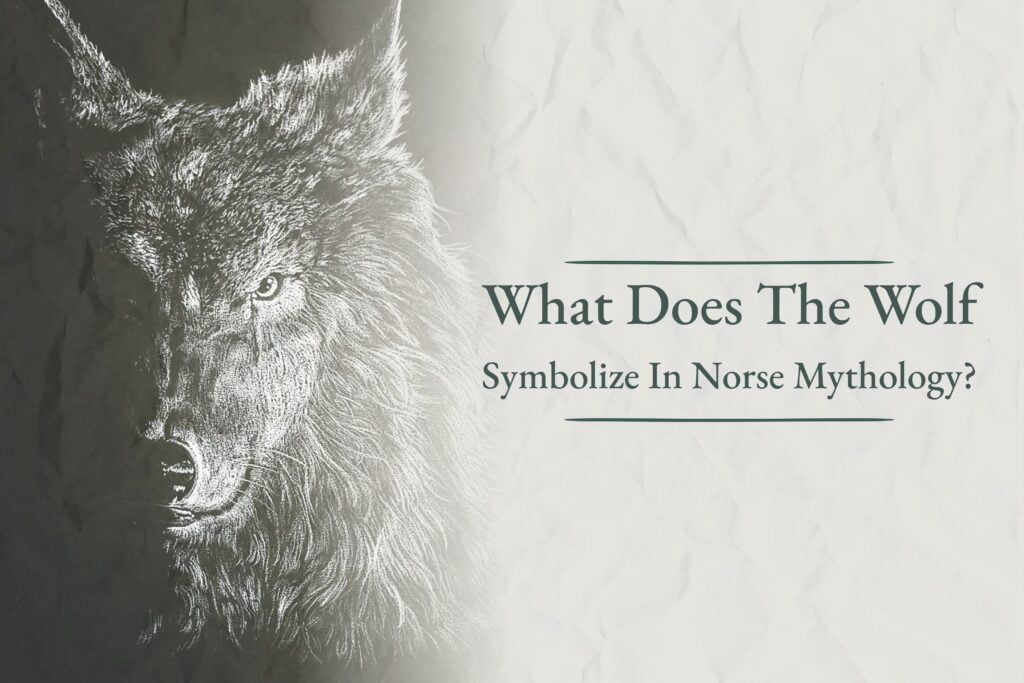Blog
What Does The Wolf Symbolize In Norse Mythology?
Norse mythology is filled with stories of brave warriors, magical creatures, and powerful gods. One of the most famous Norse myths is the story of the wolf. This creature represents fertility, strength, and courage and is often seen as a messenger or guide to the gods. In this article, we’ll explore what the wolf symbolizes in Norse mythology and why it is such an important figure. Stay tuned for more!
What do wolves represent in Norse mythology?
In Norse mythology, wolves represent strength, cunning, and ruthless aggression. They are seen as loyal to their pack but ferocious when threatened or challenged. Wolves also play an essential role in fertility and the cycle of life. These animals are often associated with violence and death but possess supernatural abilities such as shapeshifting and prophecy. In some cases, they are even thought to be able to walk on water!
So why do these mythical wolf creatures hold such a prominent place in Norse mythology? There is no one answer to that question – it may have something to do with the wolf’s impressive physical characteristics (it can survive in cold conditions for long periods), its adaptability (it can live anywhere from swampy forests to high altitudes), or its ancient history (wolves were one of the first domesticated animals). Whatever the reason, wolves will continue to play an essential role in Norse culture for years to come.
What does the wolf mean spiritually?
The wolf has long been considered a spiritually powerful animal, apart from ancient Norse mythology. Wolf symbolism has a lot to offer those who see it in a positive light. For example, the wolf is associated with strength and independence. It represents our deep instinctual desires, needs, and high intelligence. The wolf also symbolizes loyalty and communication – two impressive traits for any creature! Finally, the wolf is deeply connected to its freedom – something many of us long for on some level. All of these qualities make the wolf a potent spiritual symbol.
After all, these characteristics make wolves perfect candidates for spiritual guides or guardianship figures in many cultures worldwide. People who connect spiritually with wolves often feel very loyal to them and communicate with them on a deep level. They also experience an intense sense of freedom as they follow their path without interference from others.
Are wolves evil in Norse mythology?
There is a lot of controversy surrounding wolves in Norse mythology. Some people believe they are evil creatures, while others see them as valuable allies. But the consensus seems that wolves are not particularly beloved by the gods or humans.
One reason for this may be their propensity for raiding villages and attacking innocent people. Wolves also symbolize greed and violence, concepts that many people find disturbing. For example, Odin, the All-father and ruler of Asgard, had put a giant wolf Fenrir in chains when he went out of control.
Despite these negative associations, some redeeming qualities are associated with wolves in Norse mythology. They are often seen as spiritual animals who guide tribes through harsh conditions or help hunt down game animals large enough to provide sustenance for a tribe’s members. As such, it is possible to view wolves sympathetically despite their predatory nature.
What Norse god is associated with wolves?
Fenrisúlfr is the monstrous wolf deity of Norse mythology. He was the son of Loki and a giantess, Angerboda. A mythical wolf Fenrisúlfr represented terror, chaos, strength, and creativity. He was also known as Fenrir or Fenrisúlfr (meaning “the Unbreakable One”).
When he grew up to be a huge wolf, he became so uncontrollable that Odin had to put him into chains made from iron and hellfire. One day, when Ragnarok (the end of the world) is imminent, Fenrir will break free from his bindings and devastate Asgard (the home of the gods), killing many people in the process. However, at this point, Odin’s son Vidarr will kill this giant mythical wolf and prevent the gods from an inevitable end.
What does Fenrir symbolize?
In Scandinavia mythology, Fenrir is a giant wolf representing savagery that cannot be controlled, even by the gods. He is considered one of the most dangerous and destructive creatures in history – second only to Hel (the goddess of death). Fenrir was first mentioned in the Poetic Edda poem Völuspá (The Progression of Worlds) and has subsequently appeared in numerous sagas and poems. In particular, he plays a significant role in the story of Ragnarök, which recounts the final battle between good and evil.
In Norse mythology, Fenrir was chaos itself personified – he represented everything that was uncontrolled and unpredictable in the world. But despite his destructive nature, Fenrir always played a decisive role in the story of Ragnarök. The events of Ragnarök are sometimes described as a final battle between good and evil. The main characters involved are Odin (the god of wisdom and war), Thor (the god of thunder and strength), Freya (the goddess of love and fertility), Loki (the trickster god), Baldr (Odin’s son who died after being struck by lightning ), among other Asgardians against Jörmungandr and Fenrir.
What god kills Fenrir?
According to Norse mythology, Fenrir is the great wolf who breaks free from his chains at Ragnarök, the twilight of the gods. He then kills Odin and is eventually killed by Odin’s son Vidarr. What role does this mythical creature play in this deadly clash?
Fenrir represents nature itself – wild, destructive, and untamed. In contrast, gods are supposed to represent order and control over nature. So it makes sense that Fenrir would rebel against those who attempt to impose their will upon nature. Ultimately, it is Vidarr who deals the final blow to Fenrir – killing him with a single shot from an arrow made out of ice!

